- Home
- Peter Ackroyd
Wilkie Collins Page 8
Wilkie Collins Read online
Page 8
While in a state of enforced rest Collins also began planning the plot of his next novel, to be called The Dead Secret. He always worked out the structure of his narratives with great care and circumspection. He plotted everything, down to the most minute detail, and then worked backwards to make sure that all fitted together. There is no effect without a cause. He always decided on the end before he began. Even if he put down nothing on paper, he wrote his novel “in my head.” He had his material; then he meditated upon it, drawing lines of light between the characters, “jumping into the skins of others,” as he put it, while brooding over motives and intentions. His description of Balzac’s methods is also a depiction of his own. “He was not satisfied with possessing himself of the main idea only; he followed it mentally into its minutest ramifications, devoting to that process just that amount of patient hard labour and self-sacrifice which no inferior writer ever has the common sense or the courage to bestow on his work.”
He outlined the plot to Dickens, who immediately became engaged and excited by it. Dickens could not guess the ending, but prophesied that Collins would make a great deal of money out of the project. The two novelists also discussed another theatrical venture. They had been considering the death of one of Harriet Collins’s acquaintances, Sir John Franklin, who had led a lost expedition to the Arctic in 1845. It was last seen in the summer of that year, and speculation about its fate remained intense. In 1854 another explorer spoke to Inuit hunters who told him that the unfortunate men had succumbed to cold and to cannibalism. His report provoked outrage at home. This was the context in which Collins and Dickens discussed the possibility of a great melodrama set in the polar wastes.
Collins slowly recovered his health by the liberal use of vapour baths, or so he believed, and was able to take to the town with his illustrious companion. He met many of the most prominent French writers, and admired the “improvements” to Paris under the direction of Haussmann. He visited the theatres and the galleries and the restaurants; the relationship between the sexes was much freer and easier here than in London. He also made an unexpected discovery. While inspecting one of the innumerable second-hand bookstalls in the city he came upon Recueil des causes célèbres by Maurice Méjan. It was essentially a compendium of sensational crimes, one of which became the inspiration for The Woman in White.
He left unexpectedly and hurriedly on 10 April; the porter’s wife brought a scribbled note from him to Dickens; he did not even have time to pay the bills of the local chemist. It may be that urgent news sent him back to London. Harriet Collins had already moved out of Hanover Terrace, putting the furniture in storage in preparation for another house in Marylebone; she herself had gone into the country, while Charles had taken lodgings in Percy Street. Wilkie might have seemed to be in limbo. Yet he quickly found lodgings in Howland Street, a narrow street just off the Tottenham Court Road and only a few yards from the marine store managed by Caroline Graves. The probability is, therefore, that he was joining her and her young daughter in what was known as a “furnished apartment.” It may be that, for the sake of propriety, he rented one immediately adjacent to that of Caroline Graves.
They were dreary rooms in a drab street, in one of the most dismal areas of London, very different from the Champs-Elysées and Paris; in these circumstances he succumbed to illness once again. “I looked out,” he wrote later, “upon drab-coloured walls and serious faces through a smoke-laden atmosphere; and I must admit that I was waited on (so far as the actual house service was concerned) by people whose gloomy countenances seemed unconscious of a gleam of inner sunshine for days and days together.” This is the true London of what he called “Smeary Street.” He became interested in the plight of a young maidservant who seemed surprised when Collins spoke to her in a civil manner. For her, “life means dirty work, small wages, hard words, no holidays, no future. No human being ever was created for this.”
One of the fruits of his short stay in Howland Street was an impassioned and powerful short story, “The Diary of Anne Rodway,” in which he gives a vivid insight into the life of the poor. It is in one sense a detective story, with the first female detective in English literature. Anne Rodway is a poor “plain needlewoman” whose friend is brought home to their lodging house with a fatal blow to the head; she clutches a torn cravat in her hand and, after her death, Anne Rodway uses this clue to find her murderer.
But the interest of the story lies not so much in the intrigue of the plot as in the depiction of the lives of the outcast and the dispossessed.
“I couldn’t follow along with you,” she said, looking at her ragged shawl, “for I haven’t a decent suit of clothes to walk in. I wish I could give vent in crying for her, like you; but I can’t; all the crying’s been drudged and starved out of me long ago. Don’t you think about lighting your fire when you get home. I’ll do that, and get you a drop of tea to comfort you.”
These are the words of another poor female lodger just before the funeral. And, as Anne Rodway confides to her diary, “how much harder it seemed to live than to die.” A little earlier she had remarked that “if I had leisure to grieve, where should I find the courage to face tomorrow?” Dickens, reading the manuscript in a railway carriage, astonished his fellow passengers by bursting into tears. It is in fact one of Collins’s finest achievements, and certainly the most remarkable of his short stories. Here he conveys the violence, the misery and the raging discontent bred upon what he once called “the cruel London stones,” with an unflinching study of the daily miseries of the poor. If he had turned it into a novel, with its spare and elliptical prose, it would have been a masterpiece.
CHAPTER NINE
On the Staff
In June 1856 Collins once more went sailing with Edward Pigott; they hired a boat from the Royal Yacht Squadron and set off for Cherbourg, where they might stock the cabin cellar with fine wine. Two months later Collins was again in France, on this occasion in the company of Charles Dickens. He had accepted an invitation to stay with the Dickens family at the Villa des Moulineaux, where they intended to work together on the new play that Collins had already proposed. It was to be entitled The Frozen Deep, a romance in three acts. Collins wrote the dialogue, which Dickens then revised for his own theatrical purposes. They had been planning to spend at least two months on the work, but a sudden outbreak of cholera in Boulogne obliged the household to sail back hurriedly to England at the end of August. They had progressed far enough, however, to allow Dickens to send instructions about the painting of the sets.
On his return, Collins went to a new house. Harriet Collins had leased a property on Harley Place off Upper Harley Street, close to the New Road (now the Marylebone Road) and not a million miles from their previous dwelling in Hanover Terrace. It is likely that Caroline Graves and her daughter remained, for the time being, in Howland Street.
The joint labours of Dickens and Collins on The Frozen Deep marked the beginning of the period of their most intense collaboration. Dickens seems to have been generally startled and moved by “The Diary of Anne Rodway,” in particular, and in the early autumn of the year offered him a place on the staff of Household Words at a salary of five guineas a week. “He is very suggestive,” he told his editorial partner, W. H. Wills, “and exceedingly quick to take my notions. Being industrious and reliable besides, I don’t think we should be at an additional expense of £20.00 in the year.” By this he meant that, as a paid member of staff, Collins would not be reimbursed for his contributions. He was sure that the younger novelist, “fighting to get on,” would be strengthened by the association with his periodical.
Collins himself was not so certain. A regimen of writing anonymous articles and short stories, under the aegis of “the Inimitable”—especially since every page of the journal had the subheading “Conducted by Charles Dickens”—might not be as advantageous as Dickens thought. Might not his work be confused with that of the more prominent novelist? Dickens promptly replied to Wills that “such a confusio
n of authorship…would be a far greater service than disservice to him. This I plainly see.” Still Collins demurred. He agreed to join the periodical only on condition that it serialised his next novel under his own name. It was an admirable arrangement, testifying to Collins’s skill in matters of business. Dickens himself was not convinced that a novel by Collins would be a selling proposition, but he instructed Wills to agree to the terms. He did have slight misgivings about his junior partner, however. He once told Wills that Collins sometimes betrayed a tendency to be “unnecessarily offensive to the middle class.”
So Collins was soon working with Dickens and other stalwarts of Household Words on a collaborative story for the Christmas number of the periodical. “The Wreck of the Golden Mary,” the story of a shipwreck, has a concluding chapter written by him. “I am the captain of the Golden Mary,” Dickens told a friend. “Mr. Collins is the Mate.” Collins was also at the same time engaged on The Frozen Deep, another story of mental and physical suffering. He consulted Dickens on every stage of the composition. He travelled down to Gad’s Hill Place, Dickens’s country house in Kent, only a few days after its purchase.
With Dickens’s enthusiastic encouragement the burden of the drama falls on the afflicted figure of Richard Wardour, to be played by Dickens himself with all the passion and energy of his ferocious nature. Wardour is jealous of a rival in love, Frank Aldersley, who happens to be on the same polar expedition; he struggles with his murderous impulses before, in an act of sublime selflessness, sacrificing himself. In the climactic scene Wardour rescues his rival, played by Collins, from the frozen deep. They both grew beards in order to look the part of polar explorers, and Collins became so attached to his that he retained it for the rest of his life.
Dickens lived the role. He took long walks, declaiming his lines. “Took twenty miles today and got up Richard’s words,” he told Collins, “to the great terror of Finchley, Neasden, Willesden and the adjacent country.” Collins was no doubt less volcanic.
The schoolroom at Tavistock House was once more the centre of operations, with carpenters and plasterers busy among the actors and musicians. All was chaos—or would have been, if it had not been superintended by the master of the house. The dress rehearsal was held on 5 January 1857, followed by four more performances. Dickens was of course incandescent and transcendent. Collins was transfixed. “This is an awful thing!” he muttered as he was about to be taken up in Dickens’s arms for the final scene. And so Dickens speaks out his last words. “You will remember me kindly for Frank’s sake? Poor Frank! Why does he hide his face? Is he crying? Nearer, Clara—I want to look my last at you. My sister, Clara! Kiss me, sister, kiss me before I die!” The audience, and the other actors, wept with Dickens.
A few months later Queen Victoria agreed to attend a private performance of the play at the Gallery of Illustration together with other royals. A newspaper reported that “Prince Albert wept bitterly, and the Queen and King Leopold sobbed themselves speechless.” Victoria afterwards sent a message through her equerry that “her Majesty particularly wishes that her high approval should be conveyed to Mr. Wilkie Collins.” It was the only note of royal approbation that Collins ever received. Hans Christian Andersen was also at the performance, and was afterwards invited to Gad’s Hill Place together with Collins and other guests.
Collins has left a very funny account of the lugubrious writer of fairy stories. The Dane becomes a German, Herr von Müffe, whose conversation was judged to be “next to impossible, in consequence of his knowing all languages (his own included) equally incorrectly”; but he talked constantly, and “shed tears several times in the course of the evening.” His shabby clothes were offset by a large collection of foreign orders of merit pinned to his jacket, and he carried his money and jewellery in one of his boots for fear of robbers. He drank gin and sherry mixed in a tumbler. “He hung about the house and garden in a weak, pottering, aimless manner, always turning up at the wrong moment, and always attaching himself to the wrong person.” He amused himself by cutting out little figures of shepherds and shepherdesses in paper, and then presenting them to the ladies. He also gathered “countless nosegays” which he gave out to astonished schoolboys and labourers whom he met. The whole essay is a testimony to Collins’s propensity for comic narrative.
By the terms of the agreement which Collins had reached with Dickens, his next novel was now to be serialised in Household Words. The Dead Secret, the ending of which Dickens could not guess, began to appear at the beginning of January 1857 in weekly instalments. It is indeed the story of a secret finally revealed after chapters of suspense and plotting.
Although Collins had worked out the twists and turns of the narrative in great detail, this was the first occasion on which he had written a serial story. Consequently he was obliged to work, as he put it, “day and night” to keep up with the weekly episodes; he was only a fortnight ahead of the printers in the unrelenting race against time. For a while he shut himself up in a retreat in East Sheen, near Richmond Park, so that he might work undisturbed. Yet it was not an entirely uncongenial experience; most of his subsequent fiction would be published in weekly or monthly form.
The instalments in fact allowed him the opportunity to draw out the intrigue, beginning with a very powerful scene beside the bedside of a dying woman; the woman in question was once an actress, and indeed all of the characters in the novel have a strong dramatic flavour. Her maid is prematurely grey. “What shock had stricken her hair…with the hue of an unnatural old age?” A moment later the maid is trembling outside the door of the room of death, asking herself in a whisper, “Can she have told him?”
It is sufficiently arresting to keep the reader turning the page or waiting in excitement for the next instalment. Every episode ends on a note of expectation. What is the secret of the Myrtle Room? Why does the maid visit an abandoned grave? What are the contents of the hidden letter? Once it is set in motion, the narrative never for a moment stops. This is the true melody of Wilkie Collins. “Sarah listened, keeping her face still set toward the hall—listened and heard a faint sound behind her. Was it outside the door on which her back was turned? Or was it inside—in the Myrtle Room?” It was all a great success and, when The Dead Secret was published in volume form during the summer, sales far exceeded expectations.
Some of the reviewers thought of it as superior hokum, involving “the power of putting a mass of detached facts into a decisive and appreciable shape.” The Saturday Review went on to say that “the story constantly moves forward and we feel at the end of the chapter that we are one step nearer the end of the search.” What would have seemed familiar to Victorian readers, however, may come as a welcome surprise to a twenty-first-century audience.
Did he now, at the age of thirty-three, consider himself to be middle-aged? That was the word he used to describe a woman “say a year or two over thirty.” Yet he was already a writer of stature. In this year the literary journalist, Edmund Yates, placed him fourth among contemporary English novelists—just after Dickens, Thackeray and Charlotte Brontë—and stated that “as a story-teller he has no equal.” “No barrister or physician ever worked harder at his profession, devoted more time, or thought, or trouble to it, was prouder of it or pursued it with more zeal and earnestness…”
In the early autumn of the year Collins and Dickens set off for a “walking tour” of Cumberland. They had just taken The Frozen Deep to Manchester on two succeeding nights, the second performance before 3,000 people who were according to Collins “electrified.” Collins had also his first taste of theatrical success in the public theatres, when The Lighthouse was performed at the Olympic Theatre on Wych Street. He told his mother that there was a “perfect hurricane” of applause at the final curtain, and that he was obliged to acknowledge the audience from a private box. So there was now opportunity to cool their fevered spirits in the northern air. They also intended to keep a light-hearted journal which would then be published in Household Words.
Despite the fact that Collins could hardly walk the pair moved on to Wigton and to Allonby; Lancaster, Leeds and Doncaster were also part of their route. The innkeeper’s book for the Ship Inn, Allonby, still survives with its entry for their expenses. Lunch on 9 September was accompanied by beer, wine and whisky, at a total cost of nine shillings. Collins’s ankle was wrapped in a dirty flannel waistcoat, and he had perpetually to anoint it with a lotion of liniment; Dickens carried him in and out of the carriages they hired at every stage. After a few days he was able to move around with the help of two thick sticks. They kept up the journal, working on it after breakfast; Dickens then went on long walks, while Collins rested in the relative comfort of the inns and hotels at which they stayed. A fortnight after they had begun their journey Dickens returned to London, while Collins travelled to Scarborough where he might more easily recuperate.

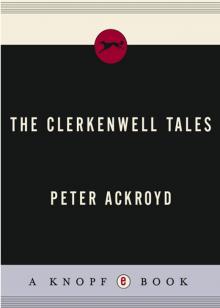 The Clerkenwell Tales
The Clerkenwell Tales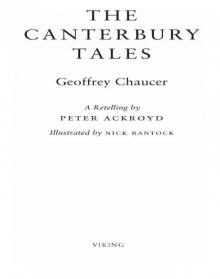 The Canterbury Tales
The Canterbury Tales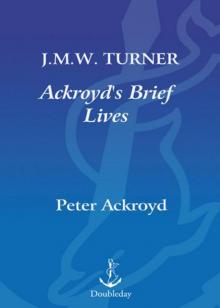 J. M. W. Turner
J. M. W. Turner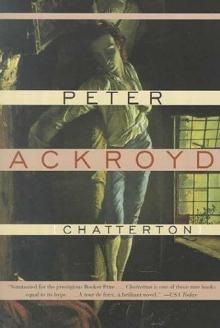 Chatterton
Chatterton The Canterbury Tales – A Retelling
The Canterbury Tales – A Retelling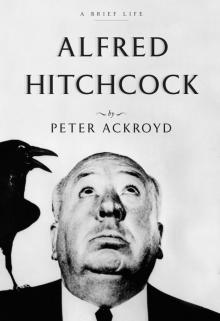 Alfred Hitchcock
Alfred Hitchcock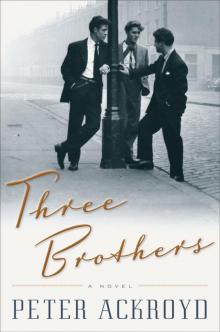 Three Brothers
Three Brothers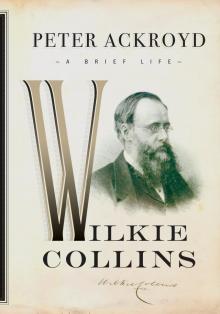 Wilkie Collins
Wilkie Collins Venice
Venice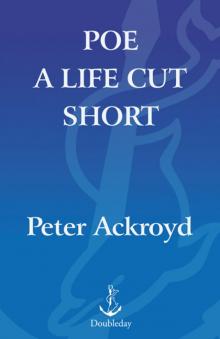 Poe
Poe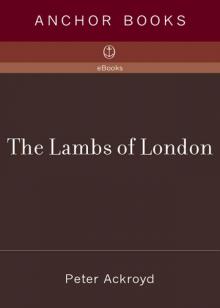 The Lambs of London
The Lambs of London London
London Queer City
Queer City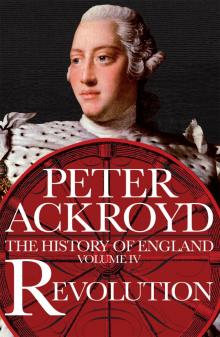 Revolution, a History of England, Volume 4
Revolution, a History of England, Volume 4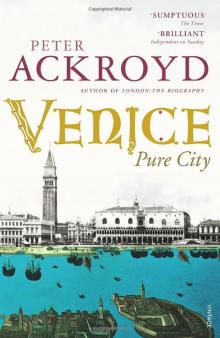 Venice: Pure City
Venice: Pure City Foundation
Foundation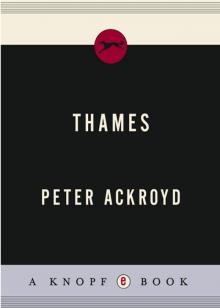 Thames
Thames The Plato Papers
The Plato Papers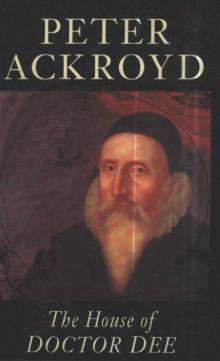 The house of Doctor Dee
The house of Doctor Dee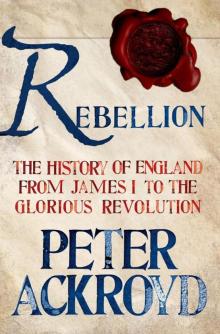 Rebellion: The History of England from James I to the Glorious Revolution
Rebellion: The History of England from James I to the Glorious Revolution Albion: The Origins of the English Imagination
Albion: The Origins of the English Imagination The Fall of Troy
The Fall of Troy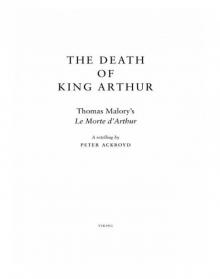 The Death of King Arthur
The Death of King Arthur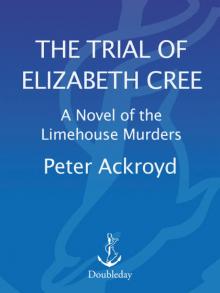 The Trial of Elizabeth Cree
The Trial of Elizabeth Cree London: The Biography
London: The Biography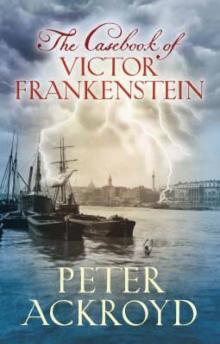 The Casebook of Victor Frankenstein
The Casebook of Victor Frankenstein Hawksmoor
Hawksmoor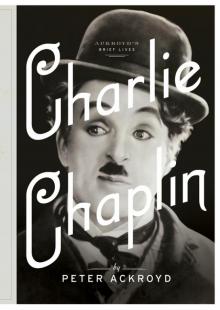 Charlie Chaplin
Charlie Chaplin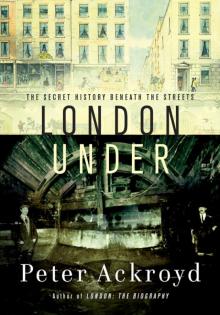 London Under
London Under